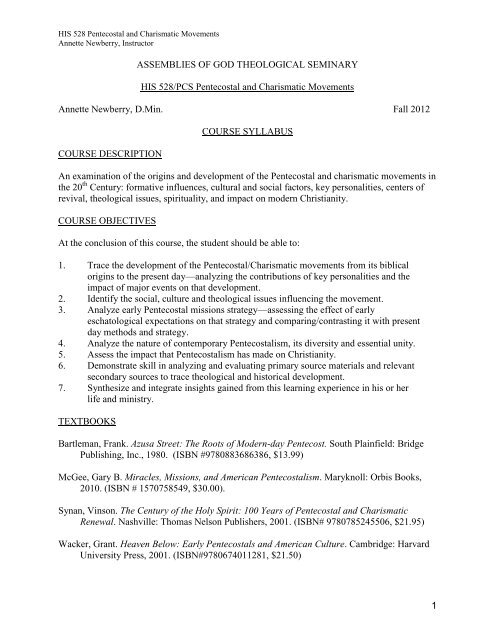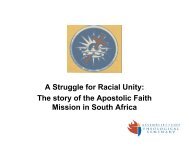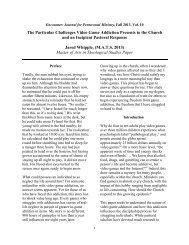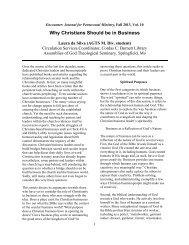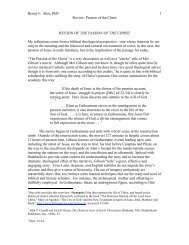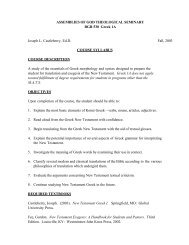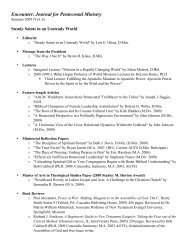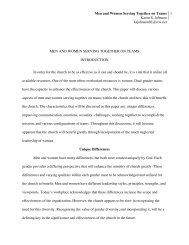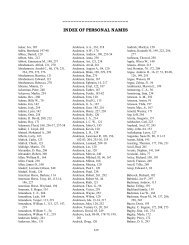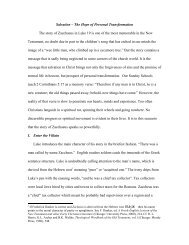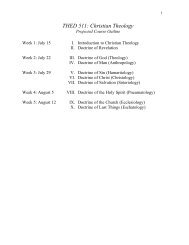Syllabus - Assemblies of God Theological Seminary
Syllabus - Assemblies of God Theological Seminary
Syllabus - Assemblies of God Theological Seminary
Create successful ePaper yourself
Turn your PDF publications into a flip-book with our unique Google optimized e-Paper software.
HIS 528 Pentecostal and Charismatic Movements<br />
Annette Newberry, Instructor<br />
ASSEMBLIES OF GOD THEOLOGICAL SEMINARY<br />
HIS 528/PCS Pentecostal and Charismatic Movements<br />
Annette Newberry, D.Min. Fall 2012<br />
COURSE DESCRIPTION<br />
COURSE SYLLABUS<br />
An examination <strong>of</strong> the origins and development <strong>of</strong> the Pentecostal and charismatic movements in<br />
the 20 th Century: formative influences, cultural and social factors, key personalities, centers <strong>of</strong><br />
revival, theological issues, spirituality, and impact on modern Christianity.<br />
COURSE OBJECTIVES<br />
At the conclusion <strong>of</strong> this course, the student should be able to:<br />
1. Trace the development <strong>of</strong> the Pentecostal/Charismatic movements from its biblical<br />
origins to the present day—analyzing the contributions <strong>of</strong> key personalities and the<br />
impact <strong>of</strong> major events on that development.<br />
2. Identify the social, culture and theological issues influencing the movement.<br />
3. Analyze early Pentecostal missions strategy—assessing the effect <strong>of</strong> early<br />
eschatological expectations on that strategy and comparing/contrasting it with present<br />
day methods and strategy.<br />
4. Analyze the nature <strong>of</strong> contemporary Pentecostalism, its diversity and essential unity.<br />
5. Assess the impact that Pentecostalism has made on Christianity.<br />
6. Demonstrate skill in analyzing and evaluating primary source materials and relevant<br />
secondary sources to trace theological and historical development.<br />
7. Synthesize and integrate insights gained from this learning experience in his or her<br />
life and ministry.<br />
TEXTBOOKS<br />
Bartleman, Frank. Azusa Street: The Roots <strong>of</strong> Modern-day Pentecost. South Plainfield: Bridge<br />
Publishing, Inc., 1980. (ISBN #9780883686386, $13.99)<br />
McGee, Gary B. Miracles, Missions, and American Pentecostalism. Maryknoll: Orbis Books,<br />
2010. (ISBN # 1570758549, $30.00).<br />
Synan, Vinson. The Century <strong>of</strong> the Holy Spirit: 100 Years <strong>of</strong> Pentecostal and Charismatic<br />
Renewal. Nashville: Thomas Nelson Publishers, 2001. (ISBN# 9780785245506, $21.95)<br />
Wacker, Grant. Heaven Below: Early Pentecostals and American Culture. Cambridge: Harvard<br />
University Press, 2001. (ISBN#9780674011281, $21.50)<br />
1
HIS 528 Pentecostal and Charismatic Movements<br />
Annette Newberry, Instructor<br />
METHODOLOGY<br />
The teaching/learning process will include lectures, PowerPoint presentations, class discussions<br />
and interaction, student presentations, small groups, media presentations, reading and writing<br />
activities, and guest speakers.<br />
COURSE REQUIREMENTS<br />
1. Attendance. Regular punctual attendance and participation in classroom activities are<br />
required. Absences must not exceed the number permitted in the seminary catalog if<br />
credit is to be given for the course. More than two absences will affect the final grade.<br />
2. Textbooks. Careful and thoughtful reading <strong>of</strong> all the required textbooks and assigned<br />
readings is necessary in order to participate in class/small group discussions and prepare<br />
for examinations.<br />
3. Assignments: The following assignments are to be completed for this course:<br />
A. Pre-session:<br />
a. A concise three page book critique <strong>of</strong> Azusa Street: The Roots <strong>of</strong> Modern-day<br />
Pentecost by Frank Bartleman (Due: First day <strong>of</strong> class).<br />
b. A concise five page book critique <strong>of</strong> Miracles, Missions, and American<br />
Pentecostalism by Gary B. McGee.(Due: First day <strong>of</strong> class). See information<br />
about Book Critiques posted on the portal.<br />
B. Post-Sesssion:<br />
C. A three page pr<strong>of</strong>ile <strong>of</strong> early Pentecostals and their characteristics from the book:<br />
Heaven Below by Grant Wacker (Due: two weeks after the module; exact date to<br />
be announced).<br />
D. One final exam over will be given for the course (Due: week <strong>of</strong> final exams; exact<br />
date to be announced).<br />
E. Research Paper or Creative Project: A research paper or creative project written<br />
mainly from primary source materials on a subject related to Pentecostal and<br />
Charismatic history. This project may be in the form <strong>of</strong> a 15-18 page research<br />
paper, a series <strong>of</strong> teaching notes with PowerPoint presentation, an interview, a<br />
video presentation or other approved projects. Suggested subjects and details <strong>of</strong><br />
this project will be discussed during the first class session (Due: two weeks before<br />
end <strong>of</strong> semester; exact date to be announced).<br />
All written materials presented to the instructor should be in correct Turabian<br />
formatting, double-spaced, using 12-point Times New Roman font with one-inch<br />
margins and left margin justification only. Each paper should contain the<br />
following information in a header, or in the case <strong>of</strong> longer projects and papers, a<br />
formal cover sheet containing the following information. The same information<br />
must be included for any assignments presented electronically and the file name<br />
should be identifiable (author’s name and title <strong>of</strong> paper; Example:<br />
jjones paper1.doc).<br />
2
HIS 528 Pentecostal and Charismatic Movements<br />
Annette Newberry, Instructor<br />
1. Name <strong>of</strong> student<br />
2. Name and number <strong>of</strong> the course<br />
3. Title <strong>of</strong> the paper<br />
4. Student’s box number at AGTS<br />
5. Date<br />
4. Flower Pentecostal Heritage Center: To facilitate doing research with primary source<br />
materials, each student should sign up as a member <strong>of</strong> the Flower Pentecostal Heritage<br />
Center before the first day <strong>of</strong> class (Free online at www.ifphc.org).<br />
5. Spiritual Formation. Spiritual Formation is an integral part <strong>of</strong> your seminary<br />
experience. Each class will begin with a short devotional and prayer time. Students will<br />
have the chance to worship together in any AGTS chapel scheduled during the module.<br />
COURSE OUTLINE<br />
I. Introduction to the Course<br />
II. Charismatic Movements up to 1900's<br />
III. Charles Parham and Early Leaders<br />
IV. Azusa Street and Other Early Revivals<br />
V. Early Controversies and Doctrinal Differences<br />
VI. Formation <strong>of</strong> Pentecostal Organizations and Church Groups<br />
V. Missions and Missionary Focus<br />
VI. Salvation and Healing Revivals<br />
VII. Charismatic and Catholic Charismatic Renewals<br />
VIII. Televangelist “Superstars”<br />
IX. Modern Revivals<br />
X. The Future <strong>of</strong> Pentecostalism<br />
COURSE CALENDAR: (TBA)<br />
GRADING PROCEDURE<br />
Final Exam 30%<br />
Textbook Comparisons and papers 30%<br />
Research Project 40%<br />
All papers and creative projects will be evaluated in the following manner according to the<br />
correct use <strong>of</strong> research methods, the relevancy <strong>of</strong> the sources, clear and logical presentation, and<br />
originally <strong>of</strong> the work.<br />
1. 20% for general presentation (Correct Turabian formatting; grammar, spelling, etc.)<br />
2. 10% for the thesis statement and introduction<br />
3. 10% for quality <strong>of</strong> reason<br />
4. 50% <strong>of</strong> content (use <strong>of</strong> primary sources, originality, etc)<br />
5. 10% for conclusion<br />
3
HIS 528 Pentecostal and Charismatic Movements<br />
Annette Newberry, Instructor<br />
AGTS Grading Scale:<br />
CAUTIONS:<br />
Publishable = A+<br />
100% - 94% = A<br />
93% - 90% = A-<br />
89% - 87% = B+<br />
86% - 84% = B<br />
83% - 80% = B-<br />
79% - 77% = C+<br />
76% - 74% = C<br />
73% - 70% = D+<br />
69% - 67% = D<br />
66% - 64% = D-<br />
1. It is expected that all work will be completed as scheduled. Late work is subject to<br />
penalty. All assigned work must be presented to the teacher before a semester grade can<br />
be issued. Failure to turn in all assigned work will result in an F.<br />
2. A grade <strong>of</strong> incomplete will be given only in the event <strong>of</strong> extreme circumstances.<br />
3. Students are requested to refrain from computer games, email, social networking, or other<br />
unassigned internet activities during class sessions.<br />
4. Please turn <strong>of</strong>f cell phones before the beginning <strong>of</strong> class. Leaving class to answer a call<br />
disrupts the class and distracts from your classroom participation. Arrangements for your<br />
personal communication need to be made before or after class and not during class.<br />
5. Plagiarism is grounds for a grade <strong>of</strong> F. The student will be referred to the Dean for further<br />
disciplinary action.<br />
ACADEMIC INTEGRITY<br />
It is assumed that students at AGTS will endeavor to be honest and <strong>of</strong> high integrity in all<br />
matters pertaining to <strong>Seminary</strong> life. A lack <strong>of</strong> respect and integrity is evidenced by cheating,<br />
fabricating, plagiarizing, misusing facilities, removing books and other property not one’s own,<br />
and disrupting classes.<br />
Cheating is defined as “intentionally using or attempting to use unauthorized materials,<br />
information or study aids in any academic exercise.” It is assumed that whatever is<br />
submitted by a student is the work <strong>of</strong> that student and is new work for that course. Fabrication is<br />
“intentional and unauthorized falsification or invention <strong>of</strong> any information or citation in an<br />
academic exercise or form.” Plagiarism is “intentionally or knowingly representing the words or<br />
ideas <strong>of</strong> another as one’s own in any academic exercise.” One who facilitates any <strong>of</strong> the above is<br />
equally responsible with the primary violator.<br />
Penalties may include restitution, an “F” on an individual paper, exam, or course; loss <strong>of</strong><br />
campus employment; disciplinary probation; removal from extracurricular activities; and<br />
suspension.—AGTS Student Handbook<br />
4
HIS 528 Pentecostal and Charismatic Movements<br />
Annette Newberry, Instructor<br />
BIBLIOGRAPHY:<br />
The Azusa Street Papers. Foley, Ala.: Harvest Publications, 1997. (Includes a reprint <strong>of</strong><br />
the issues <strong>of</strong> the Los Angeles Apostolic Faith, 1906–1908.)<br />
Burgess, Stanley M., Ed. New International Dictionary <strong>of</strong> Pentecostal and Charismatic<br />
Movements. Grand Rapids: Zondervan Publishing House, 2002.<br />
De Leon, Victor. The Silent Pentecostals: A Biographical History <strong>of</strong> the Pentecostal Movement<br />
Among Hispanics in the Twentieth Century. Taylors, S.C.: Faith Printing Co., 1979.<br />
Dempster, Murray W., Byron D. Klaus, Douglas Petersen, eds. Called & Empowered: Global<br />
Mission in Pentecostal Perspective. Peabody, Mass.: Hendrickson Publishers, 1991.<br />
Donaldson, Hal, and Joel Kilpatrick. “Inside the Los Angeles Dream Center.” Pentecostal<br />
Evangel (28 November 1999): 8–11.<br />
Du Plessis, David J. The Spirit Bade Me Go. Rev. ed. Plainfield, N.J.: Logos International, 1970.<br />
G<strong>of</strong>f, James R. Fields White Unto Harvest. Fayetteville, University <strong>of</strong> Arkansas Press, 1988.<br />
G<strong>of</strong>f, Jr., James R., and Grant Wacker, Eds. Portraits <strong>of</strong> a Generation: Early Pentecostal<br />
Leaders. Fayetteville: University <strong>of</strong> Arkansas Press, 2002.<br />
Gonzalez, Nino. Manteniendo Pentecostés Pentecostal: Hacia un Avivamiento Permanente.<br />
Miami: Editorial Vida, 1998.<br />
Harrell, David Edwin, Jr. All Things Are Possible: The Healing and Charismatic Revivals in<br />
Modern America. Bloomington, Indiana: University Press, 1975.<br />
Hoover, Willis Collins. History <strong>of</strong> the Pentecostal Revival in Chile. Translated by Mario G.<br />
Hoover. Lakeland, Fla.: By the translator, 2000.<br />
Jacobsen, Douglas. “Knowing the Doctrines <strong>of</strong> Pentecostals: The Scholastic Theology <strong>of</strong> the<br />
<strong>Assemblies</strong> <strong>of</strong> <strong>God</strong>, 1930–55.” In Pentecostal Currents in American Protestantism,<br />
edited by Edith L. Blumh<strong>of</strong>er, et al., 90–107. Urbana: University <strong>of</strong> Illinois Press, 1999.<br />
Nienkirchen, Charles W. A. B. Simpson and the Pentecostal Movement. Peabody, Mass.:<br />
Hendrickson, 1992.<br />
Warner, Wayne E. The Woman Evangelist: The Life and Times <strong>of</strong> Charismatic Evangelist Maria<br />
B. Woodworth-Etter. Metuchen: Scarecrow Press, 1986.<br />
5
HIS 528 Pentecostal and Charismatic Movements<br />
Annette Newberry, Instructor<br />
SPECIFIC DATA:<br />
Prepared by Annette Newberry<br />
March 20, 2012 (revised)<br />
Email Address: anewberry@agts.edu<br />
Office Phone: 417-268-1969<br />
6


